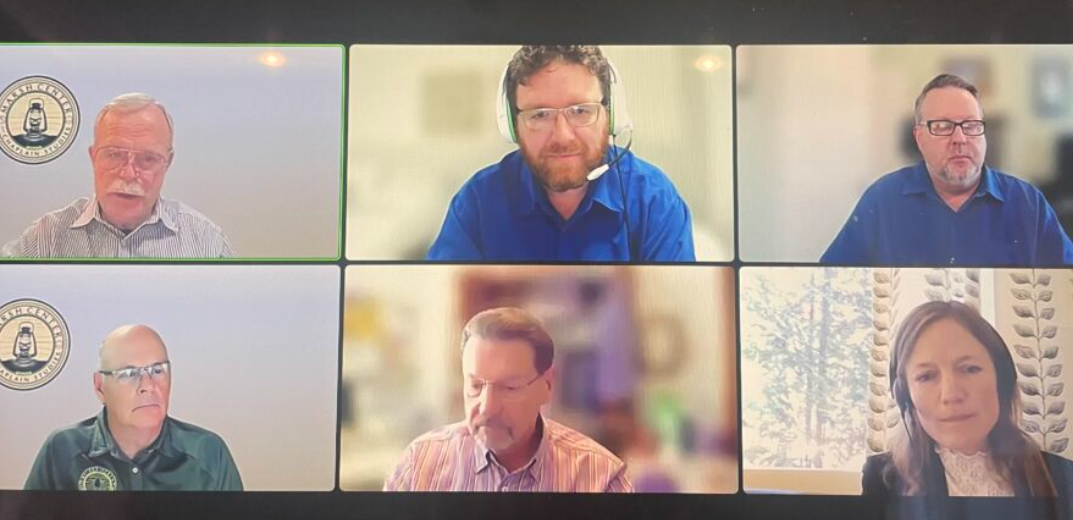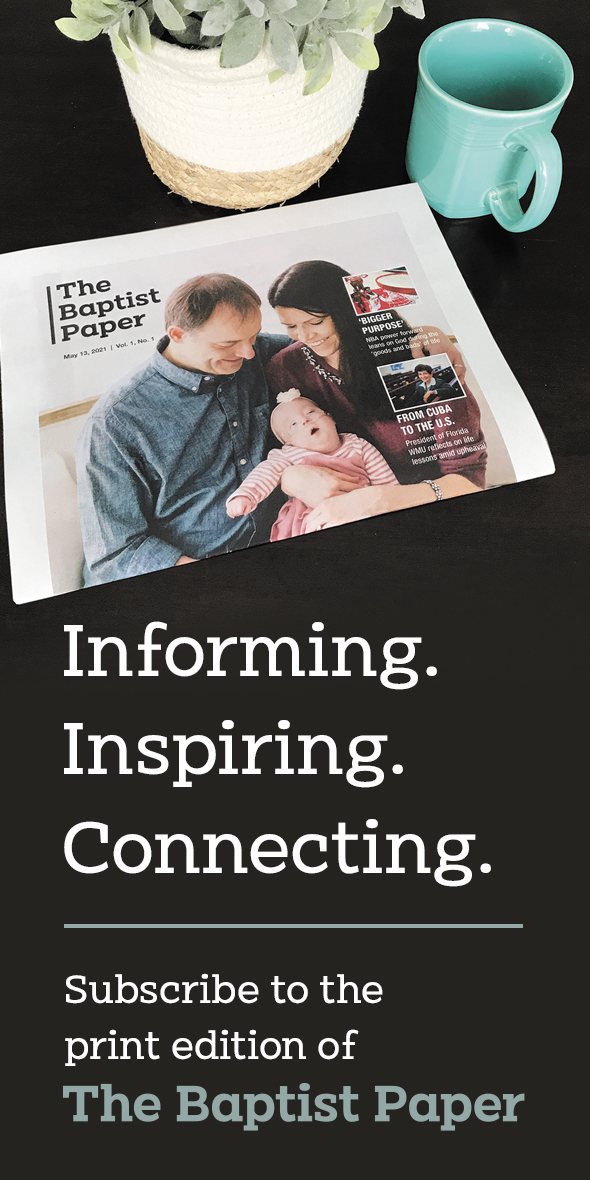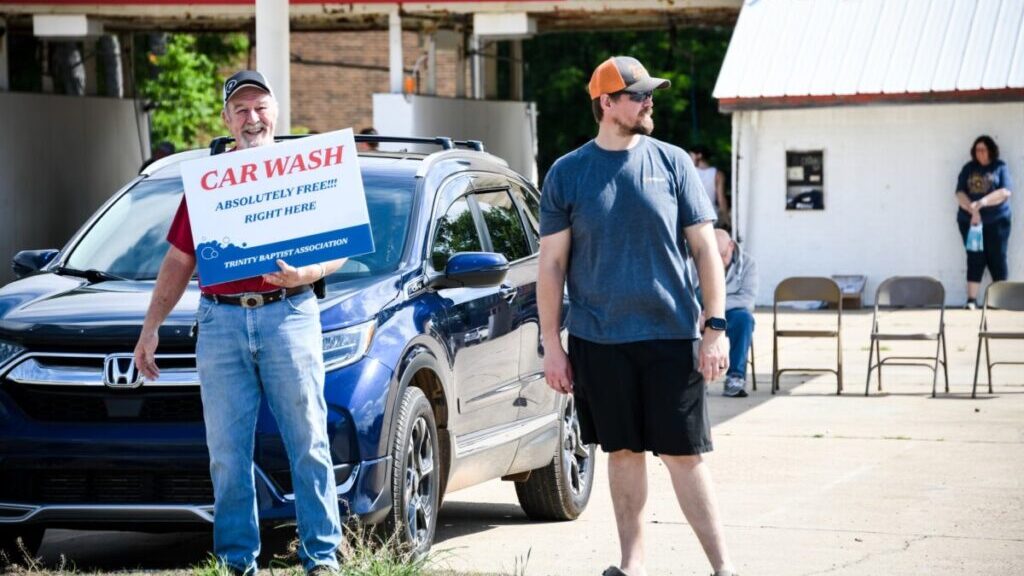Sensitivity and compassion in ministering to people with dementia and their caregivers were urged during a May 2 webinar.
Hosted by B.H. Carroll Theological Seminary’s Marsh Center, “Ministering to Those with Dementia” featured an international panel of dementia care experts.
While aimed at supporting best practices for chaplains and nursing care providers for individuals with dementia in hospital, care home and community settings, much of the information applied to anyone who provides care or support to people with dementia.
Panelists were Kristiina Juudin, a Finnish nurse and researcher with University of Turku’s Faculty of Medicine, who has studied supporting the spirituality of older people with dementia in the nursing setting; Ben Boland, chaplain and lecturer in the Centre for Aging and Pastoral studies at Charles Sturt University, Queensland, Australia; Julia Burton-Jones, chaplaincy trainer with Anna Chaplaincy of BRF Ministries, London, U.K.; and United States-based Richard Behers, hospice chaplain, clinical pastoral educator and author of “Living with Dementia using Multisensory Interventions.”
What is dementia?
Dementia is not a single disease, Juudin explained, but a term referring to several memory diseases having in common “a decline in cognition that affects coping with daily activities. Dementia causes dependence on other people” due to progressive cognitive decline.
Dementia is experienced in several diseases, including Lewy Body disease, vascular disease, and, most commonly, Alzheimer’s disease, among others. It has no cure.
Estimates predict up to 151 million people will be living with dementia worldwide by 2050, Juudin said.
Early signs of dementia might include pronounced short-term memory loss, inability to complete daily tasks which were not previously a struggle, confusion, or changes in mood or personality, Juudin explained.
These early symptoms progressively decline into more severe loss of cognitive function at variable rates specific to each individual living with dementia. In more than 20 years as a nurse, Juudin said she has observed improvement in the medications used to treat dementia.
Though these medications may slow dementia’s progression, they do not stop it, Juudin said.
Juudin’s research highlighted barriers in supporting spirituality in dementia care for nurses. These barriers included lack of time to spend with each patient, low competence in conducting spiritual support, doubts about whether spirituality benefits their patients, and the growing dependence on other people making it difficult for people with dementia to express spiritual needs.
“But,” she said, “people with dementia, like others, are looking for answers to existential questions.” So, it is important to provide an environment that supports spirituality.
“Spirituality reminds older people with dementia who they really are,” Juudin said.
It’s important to express to older individuals with dementia they are loved and valuable. Nurses can start with this baseline affirmation and look for ways to connect their patients with religious, artistic, natural and other means of finding purpose and meaning utilized in their lives before dementia, Juudin said.
What is spirituality?
Ben Boland defined spirituality as interest in meaning, hope and purpose. He said research around the world and across generations shows most older people have a high interest in spirituality.
So, “spiritual growth is not simply possible in later life, it’s likely,” Boland quoted Elizabeth MacKinlay as saying.
If older people are interested in spirituality, then the question becomes, “Are Christians interested in older people?” Boland said.
“What proportion of resources … are focused on people under 20 versus resources directed toward people over 80?” Boland asked, pointing out that Scripture commands and calls Christians to love older people, including those living with dementia.
Addressing the theological side of ministry to older people with dementia, Boland said he has been asked, “‘Does dementia prevent spiritual awakening and spiritual growth?’ No! is the short answer. … Because Christianity is all about God.
“God who is crucified and raised from the dead 2,000 years ago. Now unless you have a TARDIS, or time machine … we cannot go back and change what happened last week — let alone what happened 2,000 years ago. So, how can we start to think that our cognition effects our spirituality?
‘God never forgets us’
“Spirituality is bigger than cognition,” Boland said. “All Christians regularly forget God. But God never forgets us.” So, dementia is not a reason to neglect supporting spirituality in older adults.
Boland suggested a “Triple P Model” of dementia care: prayer, presence — simply showing up to be present with those affected by this isolating disease — and pastoral care, or loving people.
Julia Burton-Jones spoke about Anna Chaplaincy, a ministry in the United Kingdom providing “community-based chaplaincy rooted in local churches, offering spiritual care to older people of strong, little or no faith.”
While there is no U.S. equivalent of Anna Chaplains, Burton-Jones made a case for churches to provide community-based chaplains — either lay or professional, but well-trained — “who will enable growing numbers diagnosed with dementia to be nurtured spiritually.”
Prioritizing ministry to this population “allows churches to ‘join the dots’ in ministry among seniors and tells the wider world we care about people with dementia,” Burton-Jones said.
Go find them
Rich Behers closed out the panel discussing the fundamentals of professional documentation for dementia chaplaincy providers. But he also pointed to his work in developing a multisensory approach to spiritual care for dementia patients, particularly in the later stages of their disease.
He recommended chaplains utilize a Patient Interest Survey, completed by the primary caregiver of the person with dementia.
This survey will help the chaplain gain insight into ways to “reach” the person with dementia and should include:
1. What does the primary caregiver believe is their loved one’s spiritual concern or problem?
2. What faith community does the person attend?
3. How did their person’s faith influence his/her life?
4. What does the caregiver believe the chaplain could do to best serve their person and the caregiver?
5. What was your loved one’s career?
6. What hobbies did your loved one enjoy?
7. What genre of music was your loved one’s favorite?
The chaplain then can take these answers and set about producing the right sounds, scents, scenery and setting to make a connection that will draw out the person with dementia.
He described how using a certain sound — the sounds of a jet engine preparing for take-off — had “awakened” a man who had been a pilot.
“That’s my plane. I have to get to the tarmac. I’ve got a flight to catch,” the man said, opening his eyes and speaking for the first time in months.
Behers said he has all kinds of sounds. The sounds of a hair salon for a hair stylist or the sounds of reeling in a bass for someone who loved to fish might trigger a response, even when people have not spoken for some time.
“Yes, they can be reached,” he said, even in the end stages, with the right protocol.
They need to know they are safe. They need affirmations of personal worth, three to four-word statements such as: “You are loved by God. You are safe.”
They’re still here, Behers said.
And “if they’re still here, then, by God, it’s up to me to go find them. And use the skills and tools that I have to do that and to find them and love them and let them know of the great love that God still has for them.”
EDITOR’S NOTE — This story was written by Calli Keener and originally published by Baptist Standard.










